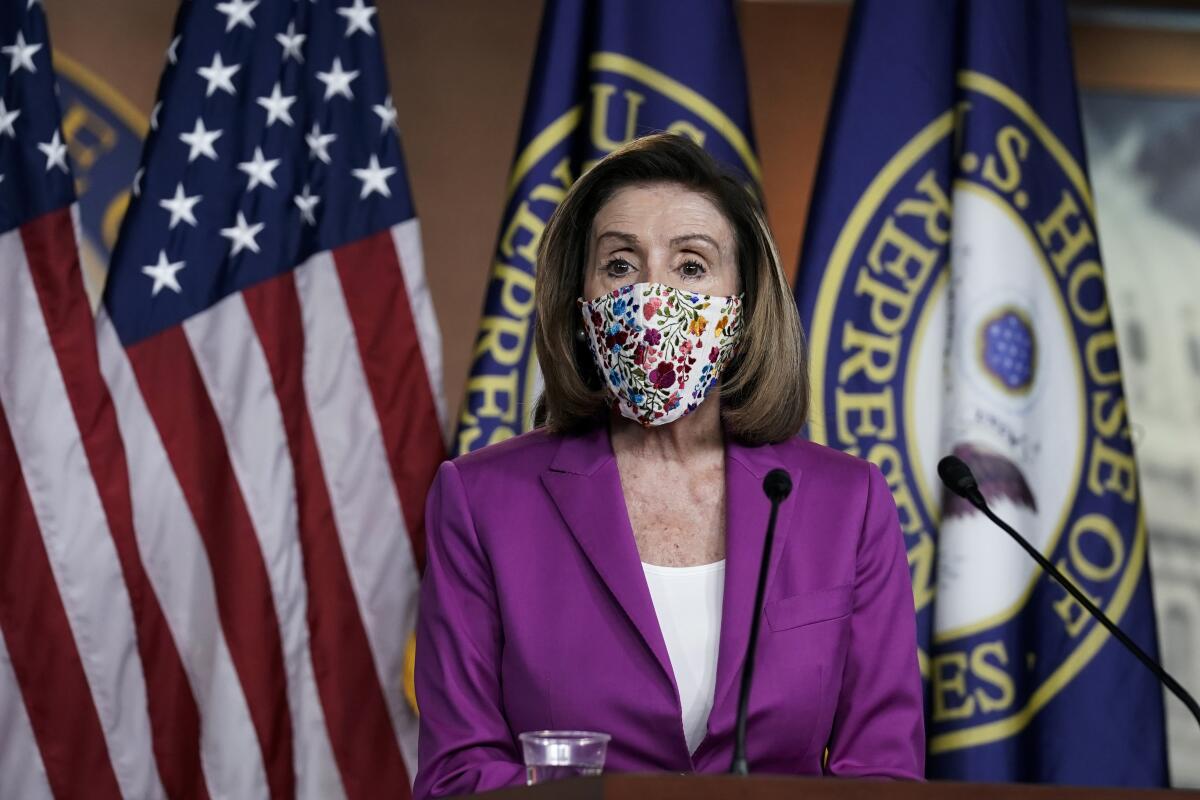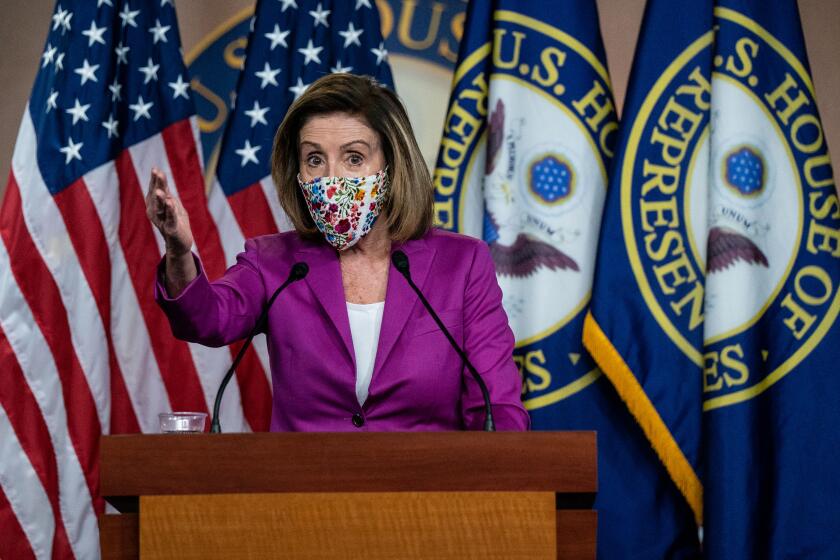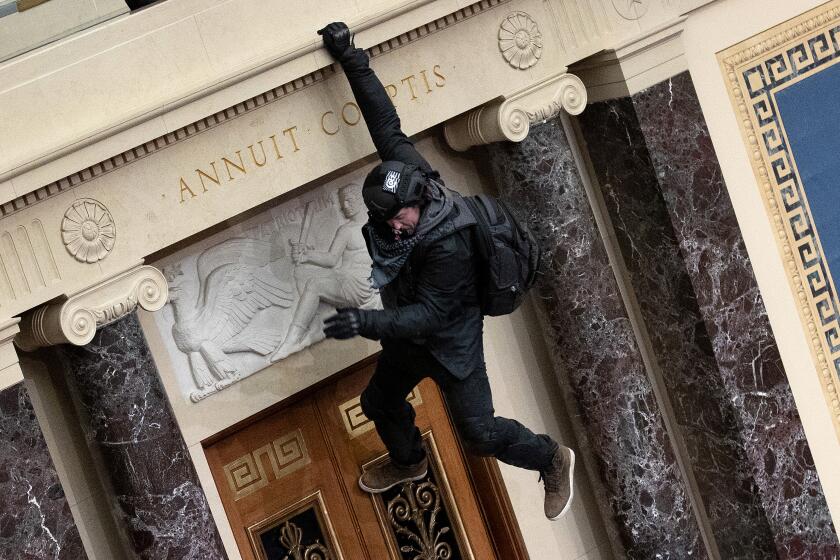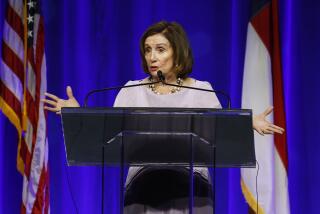Pelosi consults general on curbing Trump’s military power as House weighs impeachment

WASHINGTON — Amid mounting pressure to remove President Trump from office, House Speaker Nancy Pelosi on Friday spoke to the nation’s top military leader about taking precautions to ensure against Trump rashly initiating a military action or nuclear strike in the chaotic waning days of his presidency.
“This morning, I spoke to the Chairman of the Joint Chiefs of Staff Mark Milley to discuss available precautions for preventing an unstable president from initiating military hostilities or accessing the launch codes and ordering a nuclear strike,” Pelosi (D-San Francisco) said in a letter to her Democratic House colleagues Friday.
“The situation of this unhinged President could not be more dangerous, and we must do everything that we can to protect the American people from his unbalanced assault on our country and our democracy.”
It was just the latest head-spinning development in a tumultuous week that started with news that Trump had told a Georgia official to “find” votes for him — in an attempt to overturn President-elect Joe Biden’s victory in the state — and at midweek saw the president urging thousands of supporters to march on the Capitol to interrupt Congress’ constitutionally required session ratifying the election result. His supporters did, leaving a ransacked building and five dead, including a Capitol Police officer.
Pelosi disclosed the conversation with Milley just before her noon conference call with House Democrats to discuss plans to impeach Trump, a long-shot bid to remove him from office for inciting the siege on the Capitol. After more than three hours of discussion, Pelosi said that if Trump does not resign, Democrats will move legislation to force him from office. She gave no timeline for action. Trump’s term ends Jan. 20.
“The House will preserve every option,” she said, calling the lengthy Democratic discussion “sad, moving and patriotic.” She added, “With great respect, our deliberations will continue.”
Biden, speaking to reporters in Wilmington, Del., was noncommittal about the impeachment drive, saying he intends to focus on preparing for his inauguration, not on getting Trump out of office sooner.
“Getting him out of office — the quickest way that that will happen is us being sworn in on the 20th,” Biden said. “What action happens before or after that is a judgment for the Congress to make.”
Still, Biden had extraordinarily harsh words for Trump and welcomed the president’s announcement earlier in the day that he would not attend the inauguration ceremony — yet another in Trump’s many breaks from tradition, this one dating back 152 years and symbolic of the peaceful transfer of power.
“One of the few things he and I have ever agreed on: It’s a good thing he’s not coming,” Biden said. “He’s exceeded my worst notions of him. He’s been an embarrassment to the country. He’s embarrassed us around the world. He is not worthy to hold the office.”
Biden lavished praise on Republicans, including Senate Majority Leader Mitch McConnell of Kentucky and Sen. Mitt Romney of Utah, for standing up to Trump and refusing to challenge the electoral college results that finally were approved in Wednesday’s Senate proceedings, after police put down the Trump mob’s violent insurrection.
Biden suggested that the fallout from the Capitol rampage, which has prompted many Republicans to recoil from Trump, could make it easier to pursue a signature goal that many have viewed with skepticism: his promise to renew a bipartisan spirit in Washington after decades of increasing polarization.
Noting that he had talked to many Republicans in recent days, including Romney on Friday, Biden said, “Many of them are as outraged and disappointed and embarrassed, mortified by the president’s conduct, as I am, as the Democrats are. ... My overarching agenda is to unify this country.”
Biden’s hands-off attitude toward impeachment and talk about bipartisanship points to potential tension between his political interests and those of congressional Democrats. While impeachment is gathering steam in the House, a vote would put Republicans in a tough spot in the run-up to Biden’s inauguration, after which he will need some GOP cooperation to advance his agenda and nominations.
Asked about a possible impeachment, White House spokesman Judd Deere said, “This is a time for healing and unity as one nation. A politically motivated impeachment against a president with 12 days remaining in his term will only serve to further divide our great country.”
Congress’ Democratic leaders warned of impeaching President Trump if his Cabinet doesn’t invoke the 25th Amendment to remove him. Either way, there may not be time.
A growing number of Republicans have blamed Trump for fomenting his supporters’ violence and have begun distancing themselves from the president. Among them, Sen. Lisa Murkowski of Alaska on Friday became the first Senate Republican to call on Trump to resign. In an interview with the Anchorage Daily News, she said Trump’s influence might drive her from the Republican Party — a defection that could marginally improve Democrats’ position in a Senate about to be split 50-50 after their two victories this week in Georgia’s election runoffs.
“If the Republican Party has become nothing more than the party of Trump, I sincerely question whether this is the party for me,” Murkowski said.
The drive to remove Trump, even though he is due to leave in less than two weeks, has been fueled in part by concern that he will act recklessly, especially on military matters, in his final days.
Responding to reports of Pelosi’s call to the chairman of the Joint Chiefs of Staff, a spokesman for Milley, Col. Dave Butler, said only, “Speaker Pelosi initiated a call with the chairman. He answered her questions regarding the process of nuclear command authority.”
It isn’t likely that Milley gave Pelosi explicit assurances that he could restrict Trump’s ability to order a nuclear strike. The procedures for carrying out nuclear attacks are detailed and are built around making sure the president can quickly order an attack from anywhere, at any time.
The main check on Trump’s ability to order a nuclear strike would have to come from civilian officials, including acting Defense Secretary Christopher Miller, who took the job after the president fired his previous Defense secretary last year. They could advise Trump against it and even go public with their objections if they believed he was ordering a strike without justification.
By law, the president is the sole government official who can order a nuclear strike, though such an order has to be verified as legal by the secretary of Defense. The order would be transmitted to the head of the Pentagon’s Strategic Command, whose role is to verify it as legal and then execute it. Milley is not part of the formal chain of command; in theory, he would advise the president and the Defense secretary in any discussion on using nuclear weapons.
The extremist groups behind Wednesday’s pro-Trump mob violence plan to take the fight to state capitols, but are also hobbled by divisions. One rioter, Josiah Colt, expressed regret.
As president, Trump has access to codes necessary to order use of nuclear weapons. A military aide with the codes works at the White House and is near the president at nearly all times.
Pelosi’s overture to Milley alarmed some retired officers, who said the military shouldn’t be expected to intervene in what is ultimately a civilian decision.
“If Pelosi [and] Congress think this is a real risk, they should not be trying to find allies in the military to thwart the president. They should take immediate steps to remove him from office,” said Jim Golby, a retired Army officer who served in the White House and Pentagon and is now a senior fellow at the University of Texas.
Even before the Capitol riot, the 10 living former Defense secretaries, most of them Republicans, signed a joint statement telegraphing their concern about Trump’s erratic behavior surrounding his election loss. They warned that any attempt to involve the armed forces in ratifying the election would lead into “unlawful and unconstitutional territory.”
The letter called on current Pentagon officials to “refrain from any political actions that undermine the results of the election or hinder the success of the new team.”
Trump would be the first president since Andrew Johnson in 1869 not to attend his successor’s inauguration. Vice President Mike Pence has indicated that he is likely to attend, but a representative said Friday that Pence and his wife have not made a final decision.
Biden said he would be “honored” to have Pence attend, in contrast to his endorsement of Trump’s staying away.
On Friday, Trump was back to tweeting encouragement to his supporters, a day after releasing a carefully scripted video message admonishing the Capitol rioters. It was a message he’d agreed to record only after being informed of his potential legal liability for the violence, administration officials said.
But less than 24 hours later, Trump was on Twitter vowing that none of his supporters would be maligned or “treated unfairly.”
“The 75,000,000 great American Patriots who voted for me, AMERICA FIRST, and MAKE AMERICA GREAT AGAIN, will have a GIANT VOICE long into the future,” Trump tweeted. “They will not be disrespected or treated unfairly in any way, shape or form!!!”
Meanwhile, the FBI and local law enforcement agencies were stepping up efforts to track down and charge those seen in videos and photographs storming and vandalizing the Capitol and attacking police. A number of arrests were made throughout the day. And by late Friday, Twitter announced that it was “permanently suspending” Trump’s account.
Times staff writer Noah Bierman contributed to this report.
More to Read
Get the L.A. Times Politics newsletter
Deeply reported insights into legislation, politics and policy from Sacramento, Washington and beyond. In your inbox three times per week.
You may occasionally receive promotional content from the Los Angeles Times.















